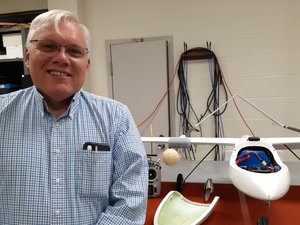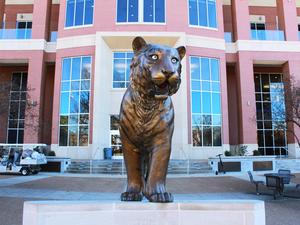Sunflowers grow in a greenhouse on the top floor of the Life Sciences Building at the University of Memphis.
Researchers are preserving the sunflowers, along with other crop species, so that scientists will be able to study the plants in the future.
Jennifer Mandel, Ph.D., an associate professor in the Department of Biological Sciences at the University of Memphis, said studying the DNA of plants allows scientists to discover new traits when breeding more resilient crops.
Mandel has been at the university for about 10 years and teaches molecular ecology, ecological genetics, and general biology.
“We’re interested in studying and protecting [different plants] because they might have traits that could help the cultivated sunflower,” Mandel said. “Maybe they’re more adaptive to wetter or drier climates or they have some disease resistance that you could breed into the cultivated species. So you wouldn’t have to genetically modify [the plant], because you could just breed it.”
Mandel and her colleagues’ research is aimed at improving many facets of crops in the Mississippi River Delta, and their work is seeding a new institute at the U of M.
The institute
Along with her sunflower research, Mandel is the director of the U of M’sInstitute for Agriculture and Conservation Research and Education (ACRE).
Launched this fall semester, the institute doesn’t fall directly into a specific college at the university, allowing students from any academic program to study at ACRE.
The institute began a new class, Introduction to Agriculture Studies, and interdisciplinary minor, Agriculture Studies. Additionally, Mandel said they are developing programming certificates and credentialing focused on conservation and agri-STEM for students.
Mandel said that since the U of M is not a land grant university, it does not already include a traditional agricultural program. ACRE represents a way for faculty and students to contribute to agricultural education and research.
While ACRE’s research will focus on the Mid-South, Mandel said they hope it will have an international impact.
“It’s a two-fold mission around research and education to advance scientific discovery and workforce development, with a focus on the region supporting thriving ecosystems and supporting the next generation of conservationists and agriculture scientists,” she said.
Alongside Mandel, associate directors Chris Ramezanpour and Shawn Brown, Ph.D., are leading the institute.
Brown is an associate professor in the Department of Biological Sciences. He came to the U of M after graduate work at Kansas State University and post-doctoral work at the University of Illinois and Oregon State University.
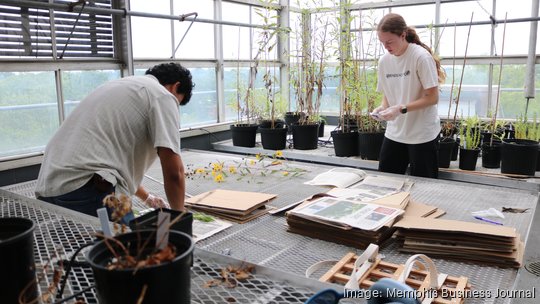
Brown is a microbiologist and works with things “much smaller” than crops, he said.
His main research investigates how microorganisms like bacteria and fungi affect plants. So, while some of his research focuses on seeing what types of fungi can harm certain plants, he tries to find other fungi that can potentially protect them.
“That [research] can ask you to [pose] questions on a fungal level … and has led to a couple of papers with new grant opportunities,” Brown said.
These types of studies can be used to help agricultural producers and farmers maintain crops.
Ramezanpour has worked in various food startups after getting his master’s in public policy at Harvard Kennedy School. He is president of the Memphis-based firm Secure Food Solutions.
He became interested in agricultural practices after spending time with farmers in Kenya. He has experience in grant writing for his own startups and is working on grants for ACRE.
“I get to work with these guys on [agriculture] and conservation innovation. [It’s] stuff that I’ve been interested in for a long time,” Ramezanpour said.
The funding
University of Memphis fundraiser Hannah Waldman has teamed up with ACRE’s directors to come up with a fundraising strategy.
Mandel and Waldman, who is the U of M’s senior director, Principal Gifts, have been working across campus to find research and educational partners with shared interests in ACRE’s mission and the potential to support it, including government sources, corporations, organizations, and individuals.
“One of the things that interests potential leaders so much about this project is that we’re not just asking for investment, we’re also asking for different levels of partnership,” Waldman said. “We’re bringing a lot to the table that these corporations have been asking for.”
In terms of the people interested in funding ACRE, the entities are entirely new for Waldman.
“You can’t put on your regular fundraising hat,” she said. “You have to be thinking, ‘What are all the different assets that this project is bringing forward? And who are the right partners we can work with so that we’re helping them develop their sector?’”
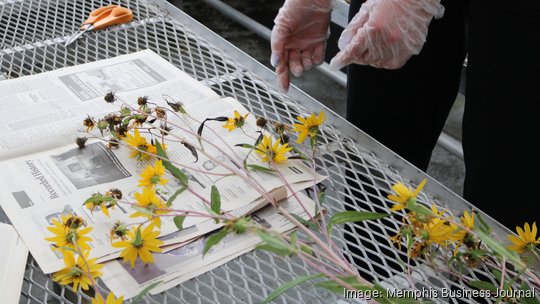
In May, the University of Memphis received nearly $150,000 from the Delta Regional Authority (DRA) — out of nearly $600,000 allocated to the DRA from the 2021 federal Bipartisan Infrastructure Law — to produce an agribusiness development plan.
That plan is focused on education and workforce training in agri-STEM, as well as economic development, by capitalizing on specialty crop production. ACRE is partnering on the project with the University of Arkansas at Pine Bluff, Alcorn State University, Jackson State University, and Rust College.
The DRA initiative includes 44 counties across the Delta region. The project keys in on community engagement, including surveys, focus groups, and personal interviews with students, teachers, farmers, consumers, and 50 companies in grocery, food processing, and other food and agribusiness sectors.
The impact
ACRE is set to focus on three areas of research: conservation and soil health; climate-resilient systems; and biomanufacturing.
“We took some time in the past year to do some thoughtful consulting work with folks to understand where our niche could be in this space for agriculture and sustainability,” Mandel said.
Conservation and soil health research at ACRE will look into the impacts of agriculture and production on climate, water, soil, and air. Mandel said this area is a great opportunity for scientists to collaborate with engineers to solve problems.
Climate-resilient systems will involve studying what crops could do well, and what kind of genetic diversity crops is needed to survive a variety of weather patterns in different locations.
Lastly, ACRE’s biomanufacturing research will look at how fungi and bacteria affect certain plants.
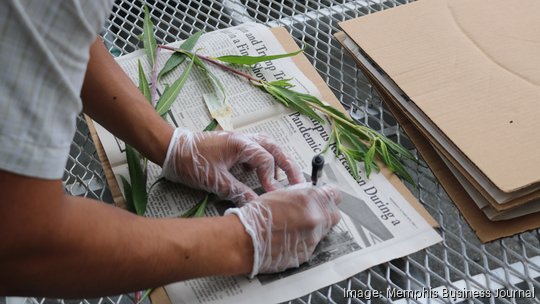
ACRE’s leaders said that companies often seek out third parties to verify claims, and oftentimes, universities are tapped to do so.
The institute has created a commercialization lab to enable partnerships through contract research, startups, or existing companies.
Collectively, the work at ACRE seeks to make a great impact in the Delta. They also hope the uniqueness of the institute will help its students stand out to employers for potential internships and jobs.
Ramezanpour said one of their goals is to figure out how to bring more fruits, vegetables, flowers, and nuts into the Delta.
“We can grow [those] here at scale. Tell us what you need, what volumes, and what quality, and we can start developing strategies with farmers on how they can do that,” he said.
He added that the Delta has the ability to produce food like places such as Florida or South America — and can do it with conservation and environmental stewardship.
“The Delta can also participate and create billions of dollars in new economy that way,” Ramezanpour said. “We’re trying to hit on all different aspects of agricultural and economic development [at ACRE].”
Sign up for the Business Journal’s free morning and afternoon daily newsletters to receive the latest business news impacting the Memphis metro area. Download the free Memphis Business Journal app for breaking news alerts on your phone.

